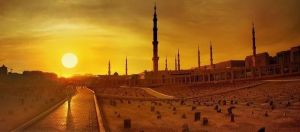A man from the unbelievers said: “Islam is a religion, if only it had men.”
“Islam is a religion if only it had men!” And by Allah! He did not lie!
Today they scorn our Islam and our Qur’an, and ridicule our Prophet (salAllaho alayhi wasallam), and they ask: “Why are you terrorists?” So what do you want us to be surrendered and defeated?
In their law it is forbidden to mock at all religions except Islam. And they say about Islam that it is the religion of people who are morally cheap. They mean by it our Prophet (salaAllahu ‘alayhi wa salam).
So from where will we find the likes of Mu’awwaz RA and Mu’aadh RA? From where will we get the likes of Bin Unais RA and those people?
Listen to this, and let us cry together on ourselves. The author of Durar al-Makinah narrated, in the third book on page no. 202 exactly, that a group of senior Christians gathered to meet a Mongol king who had become Christian.
One of the Christian scholars started mocking our Prophet (salaAllahu ‘alayhi wa salam) and there a hunting dog was tied. The dog started barking loudly and getting violent toward the Christian.
They moved it away from him with great difficulty. A man from them said: “He did this because of your talk on Muhammad,” but the Christian replied: “No, actually this dog is arrogant. He saw me pointing so he though I wanted to beat him.”
Thus, he returned to the mockery of the Prophet (salaAllahu ‘alayhi wa salam) impudently in a fiercer manner. At this the dog broke his bonds and jumped on the neck of the Christian, and tore his throat at the instance. He died immediately and at that 40,000 Mongols accepted Islam.
The dogs envied and were angered. The dogs envied and were angered.
So where is our anger?
The trees and the plants longed for you O Beloved of Allah, so where is our longing?
Al-Hasan al-Basri (rahiimahullah) whenever he heard of the hadith of the crying of the stem of the tree on the parting of the Prophet (sala Allahu ‘Alayhi wa salam), he would cry and say “O Community of Muslims! The trees and the plants were affectionate to the Messenger of Allah. The trees and the plants were affectionate to the Messenger of Allah (sala Allahu ‘Alayhi Wa Salam) do you not feel affection to his memory?”
The Prophet (sala Allahu ‘Alayhi Wa Salam) always used to tell his Companions: “I am longing for my brothers. I am longing for my brothers.”
So they said: “Are we not your brothers?”
He said to them: “You are my Companions. My brothers are those who will have faith in me and will believe in me and follow me without seeing me.”
So what will we tell him when people will gather and reach his pond and he will say to us: “They mocked at me and ridiculed me and hurt me, so what did you do to defend me and my honour?”
An eye-opener!




